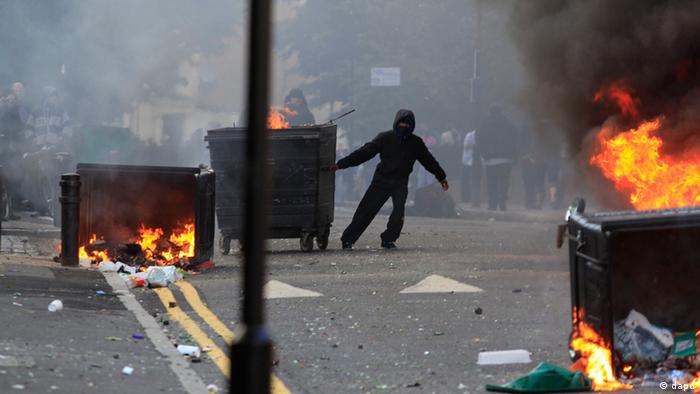
From August 6-10 last year, several English cities saw some of
the worst riots in a generation. DW spoke to three people closely
involved in what happened: a local politician, a business owner and a
youth worker.
The riots began in Tottenham, North London on August 6, 2011, after the
fatal shooting by police of a local black man, 29-year-old Mark Duggan.
A peaceful protest against his death turned violent after police
arrived to disperse the demonstrators. Overnight there were violent
clashes in the area. In the days that followed, bouts of rioting,
looting and arson spread elsewhere in London and to other cities across
England.
British Prime Minister David Cameron returned from his holiday in Italy to address the situation. All police leave was cancelled and thousands of officers were deployed to bring the situation under control.
A year on, with Britain in the midst of Olympics fever - and an ongoing climate of economic austerity - we look at how communities have been affected by the violence, what the underlying causes were, and whether it could happen again.
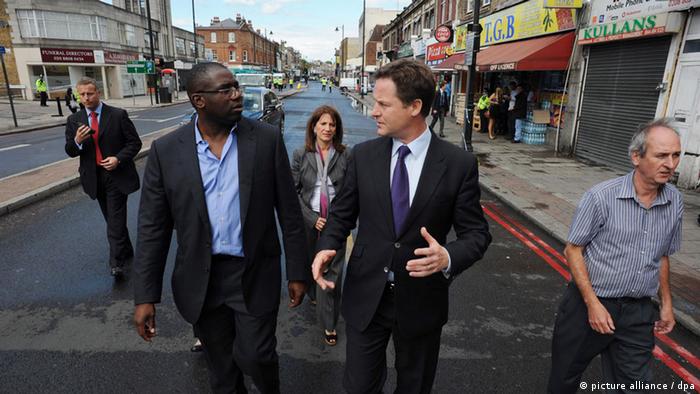 David Lammy shows Deputy Prime Minister Nick Clegg around the streets of Tottenham
'There are huge inequalities in Britain'
David Lammy shows Deputy Prime Minister Nick Clegg around the streets of Tottenham
'There are huge inequalities in Britain'
David Lammy is a British Labour Party politician who has been a member of parliament (MP) for Tottenham since 2000. The 40-year-old was born in the area to Guyanese parents.
DW: Have things changed in Tottenham since last year? Have people really learnt from what happened?
David Lammy: This is a resilient community. There are 220 languages spoken here; it knows how to pull together. It's been through tough times before. Many of the families here know what it means to live in tough circumstances and indeed come from other countries that are tough. The government has given the area some regeneration funds through the mayor; the football club is staying and committing and rebuilding their stadium; and tensions and issues with the police are being addressed.
But at the same time, unemployment has gone up in Tottenham, not down, since the riots. Austerity is biting this year in a way that it wasn't last year. Youth services have been cut, and we're seeing that filtering through. So we're resilient, we're coming together, we have the world's attention, we have a lot of support, but there's a lot to do, and all of this is happening against a very fragile background of a double-dip recession in Britain.
You published a book last year called "Out of the Ashes: Britain after the Riots." What's your assessment of why the riots happened?
My view is that it always takes a flashpoint to begin a riot - that's usually a flashpoint involving the police or the state and a perceived act of injustice, usually a death, whether that's in Paris, Los Angeles or London. But then beyond that in Britain what we saw last August was a combination of two things: A culture that has set in in Britain where everyone is conscious of their rights, but not of their responsibilities.
And so I do think individuals have to be held to account for what they have done […]. The second thing is an economic liberalism - the freedom to make as much money as you want without any consequences. And I'm afraid it's had catastrophic consequences: There are huge inequalities in Britain. Which means we've moved on some of our housing estates from having a working-class community, to having a workless-class community.
Do you think the riots could happen again?
I think it's unlikely in Tottenham, because of the pulling together, and the serious anger here towards those who did cause mayhem. Having said that, it's fragile, and I certainly think that the circumstances that underpin the riots remain the case in Britain.
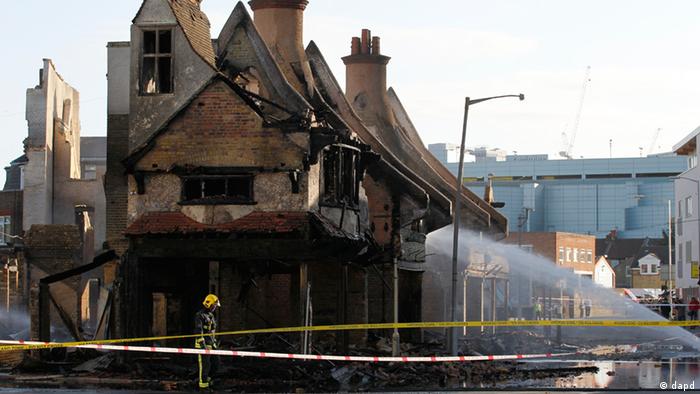 The House of Reeves store was over 100 years old when it burned down
'You don't realize what you've got till its gone'
The House of Reeves store was over 100 years old when it burned down
'You don't realize what you've got till its gone'
Trevor Reeves runs House of Reeves, a furniture store in Croydon, south London. Founded in 1867, the store survived the Blitz during World War II. But on August 8, 2011, the iconic building was destroyed in an arson attack. The blazing building became one of the symbols of the riots. Trevor Reeves is the great-great-grandson of the store's founder, Edwin Reeves.
DW: How did you actually learn the news that the store had been attacked?
Trevor Reeves: I stood outside and watched it burn. I was told by a neighbor that there was some activity around the shop, and I might like to go down and see what was going on. So that's what I did. I drove down to the store, parked round the back, and by the time I'd come back out the car, and stood there looking, there were people milling around; a couple of minutes later there was smoke and flames, and that was the end of that.
What was the response from the local community when they found out that "Reeves Corner" had burnt down?
It was just staggering. The outpouring of emotion was something that I don't think any of us will ever forget or anyone of us realized was even there. It brought life to the old adage: "You don't realize what you've got till it's gone." And there were people who just thronged to the store, just to stand and see...
What's it like now, one year on? Have you got a clearer sense of where the business can go from here?
We've remodeled everything. We are now trading as a viable business again. The difficult thing is that we are still in austerity times. It's very difficult out there. We still fight for market share in the area. We're a much smaller store than we were before. We don't have so many lines.
Are you concerned at all that the riots could happen again?
I'm sure there are criminal elements, subversive elements, people who want to create mayhem and destruction and cause mischief, and I'm sure they will be planning to try and do something. On the other side of the coin I think the authorities are that much more aware of the responsibilities to everybody, and that they will stamp on it before it gets a chance to rear its ugly head. At least I hope they would.
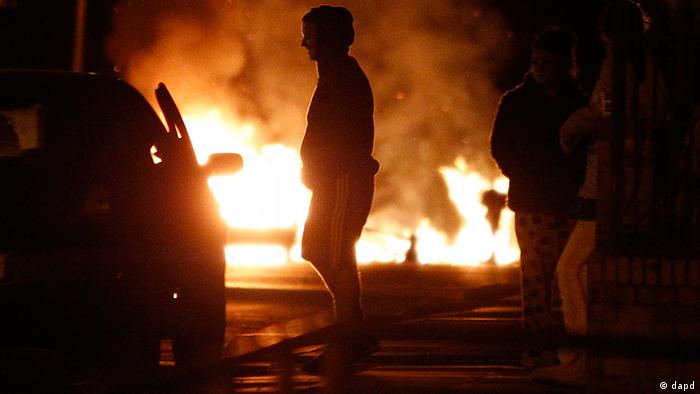 The violence spread to other cities, including Manchester
'Something had broken down'
The violence spread to other cities, including Manchester
'Something had broken down'
Ruth Ibegbuna is director of the Reclaim project, a charity that works with teenagers, mainly from deprived communities, across Greater Manchester. It provides them with mentors who help them to build up their confidence and leadership skills.
DW: What was your response to the riots last summer?
Ruth Ibegbuna: We were utterly dismayed. Manchester was one of the last cities to riot. London had rioted and other areas of the country, and there was a real sense of inevitability that Manchester might actually be the next city. And we felt very strongly that there wasn't enough done to ensure that the city didn't riot, and really we needed to get out there and talk to our young people and stop them from going onto the streets.
How were the young people that you work with affected by the riots?
Many of them were glued to their TVs as most people in Manchester were, watching our city center be destroyed, and watching the vandals and the looting that went on. And just like us, they were really upset. I had a meeting with the young people the next day, and many of them were in tears, because they recognized that something had broken down, and that the adults in the community now distrusted the young people. That was very clear in the days after the riots.
What lessons have been learnt since then?
Depressingly, I don't think many lessons have been learnt. We've had riots before, for instance in the 1980s, and afterwards there were big inquiries and people really looking at society and asking, 'What went wrong here and what can we change?' Unfortunately this time with the riots, we've patched up our city centers and we've locked up the people who committed the crimes, and then we've moved on.
I'm worried that we haven't had that necessary dialogue that looks at what went wrong there, at what were the underlying causes. Criminality, of course, was a massive part of it, but there was something else going on there, and I feel that we've not really uncovered that and unpicked it and dealt with it.
British Prime Minister David Cameron returned from his holiday in Italy to address the situation. All police leave was cancelled and thousands of officers were deployed to bring the situation under control.
A year on, with Britain in the midst of Olympics fever - and an ongoing climate of economic austerity - we look at how communities have been affected by the violence, what the underlying causes were, and whether it could happen again.
 David Lammy shows Deputy Prime Minister Nick Clegg around the streets of Tottenham
David Lammy shows Deputy Prime Minister Nick Clegg around the streets of TottenhamDavid Lammy is a British Labour Party politician who has been a member of parliament (MP) for Tottenham since 2000. The 40-year-old was born in the area to Guyanese parents.
DW: Have things changed in Tottenham since last year? Have people really learnt from what happened?
David Lammy: This is a resilient community. There are 220 languages spoken here; it knows how to pull together. It's been through tough times before. Many of the families here know what it means to live in tough circumstances and indeed come from other countries that are tough. The government has given the area some regeneration funds through the mayor; the football club is staying and committing and rebuilding their stadium; and tensions and issues with the police are being addressed.
But at the same time, unemployment has gone up in Tottenham, not down, since the riots. Austerity is biting this year in a way that it wasn't last year. Youth services have been cut, and we're seeing that filtering through. So we're resilient, we're coming together, we have the world's attention, we have a lot of support, but there's a lot to do, and all of this is happening against a very fragile background of a double-dip recession in Britain.
You published a book last year called "Out of the Ashes: Britain after the Riots." What's your assessment of why the riots happened?
My view is that it always takes a flashpoint to begin a riot - that's usually a flashpoint involving the police or the state and a perceived act of injustice, usually a death, whether that's in Paris, Los Angeles or London. But then beyond that in Britain what we saw last August was a combination of two things: A culture that has set in in Britain where everyone is conscious of their rights, but not of their responsibilities.
And so I do think individuals have to be held to account for what they have done […]. The second thing is an economic liberalism - the freedom to make as much money as you want without any consequences. And I'm afraid it's had catastrophic consequences: There are huge inequalities in Britain. Which means we've moved on some of our housing estates from having a working-class community, to having a workless-class community.
Do you think the riots could happen again?
I think it's unlikely in Tottenham, because of the pulling together, and the serious anger here towards those who did cause mayhem. Having said that, it's fragile, and I certainly think that the circumstances that underpin the riots remain the case in Britain.
 The House of Reeves store was over 100 years old when it burned down
The House of Reeves store was over 100 years old when it burned downTrevor Reeves runs House of Reeves, a furniture store in Croydon, south London. Founded in 1867, the store survived the Blitz during World War II. But on August 8, 2011, the iconic building was destroyed in an arson attack. The blazing building became one of the symbols of the riots. Trevor Reeves is the great-great-grandson of the store's founder, Edwin Reeves.
DW: How did you actually learn the news that the store had been attacked?
Trevor Reeves: I stood outside and watched it burn. I was told by a neighbor that there was some activity around the shop, and I might like to go down and see what was going on. So that's what I did. I drove down to the store, parked round the back, and by the time I'd come back out the car, and stood there looking, there were people milling around; a couple of minutes later there was smoke and flames, and that was the end of that.
What was the response from the local community when they found out that "Reeves Corner" had burnt down?
It was just staggering. The outpouring of emotion was something that I don't think any of us will ever forget or anyone of us realized was even there. It brought life to the old adage: "You don't realize what you've got till it's gone." And there were people who just thronged to the store, just to stand and see...
What's it like now, one year on? Have you got a clearer sense of where the business can go from here?
We've remodeled everything. We are now trading as a viable business again. The difficult thing is that we are still in austerity times. It's very difficult out there. We still fight for market share in the area. We're a much smaller store than we were before. We don't have so many lines.
Are you concerned at all that the riots could happen again?
I'm sure there are criminal elements, subversive elements, people who want to create mayhem and destruction and cause mischief, and I'm sure they will be planning to try and do something. On the other side of the coin I think the authorities are that much more aware of the responsibilities to everybody, and that they will stamp on it before it gets a chance to rear its ugly head. At least I hope they would.
 The violence spread to other cities, including Manchester
The violence spread to other cities, including ManchesterRuth Ibegbuna is director of the Reclaim project, a charity that works with teenagers, mainly from deprived communities, across Greater Manchester. It provides them with mentors who help them to build up their confidence and leadership skills.
DW: What was your response to the riots last summer?
Ruth Ibegbuna: We were utterly dismayed. Manchester was one of the last cities to riot. London had rioted and other areas of the country, and there was a real sense of inevitability that Manchester might actually be the next city. And we felt very strongly that there wasn't enough done to ensure that the city didn't riot, and really we needed to get out there and talk to our young people and stop them from going onto the streets.
How were the young people that you work with affected by the riots?
Many of them were glued to their TVs as most people in Manchester were, watching our city center be destroyed, and watching the vandals and the looting that went on. And just like us, they were really upset. I had a meeting with the young people the next day, and many of them were in tears, because they recognized that something had broken down, and that the adults in the community now distrusted the young people. That was very clear in the days after the riots.
What lessons have been learnt since then?
Depressingly, I don't think many lessons have been learnt. We've had riots before, for instance in the 1980s, and afterwards there were big inquiries and people really looking at society and asking, 'What went wrong here and what can we change?' Unfortunately this time with the riots, we've patched up our city centers and we've locked up the people who committed the crimes, and then we've moved on.
I'm worried that we haven't had that necessary dialogue that looks at what went wrong there, at what were the underlying causes. Criminality, of course, was a massive part of it, but there was something else going on there, and I feel that we've not really uncovered that and unpicked it and dealt with it.
一名男子承認在去年夏天倫敦騷亂期間放火燒燬一家百年家具店。
33歲的戈登·湯姆遜(Gordon Thompson)在倫敦刑事法庭舉行的審判中表示認罪。法院聽到,湯姆遜從家具店裏偷走一部手提電腦後便向周邊的人詢問有無打火機,然後點燃一個沙發。
火勢非常大以至於街對面的房子也著起火來,路中央的有軌電車線也受到損害。
被焚毀的家具店後來被推倒,但是這個已經營了144年的家具店—裏夫斯家具店(the Reeves)目前仍在鄰近的一家店鋪裏繼續營業。
法官彼得·桑頓(Judge Peter Thornton QC)說,湯姆遜將被判長期監禁。宣判日期訂在4月11日。
湯姆遜此前曾承認在克洛伊頓的兩家商店偷盜,但否認參與了家具店縱火案。
但在檢控方庭審接近尾聲時他決定改口承認某些指控。
Retail | 31.08.2011
London businesses struggle to reopen after riots
One of the iconic images from the riots was the destruction of the Reeves Furniture Shop in Croydon, south London, a family business that had survived two world wars and five generations. Pictures of flames ripping through the Reeves building were beamed around the world on the night of Monday, August 8.
Since then the shop has become a symbol of British resilience. The owners worked tirelessly to re-open the store in just a few days. Fortunately, they had other premises just meters from where their main shop was burned to the ground.
"We have the second store. It was saved by the fire crews," says owner Trevor Reeves. "It would have been very easy just to board it up and let the insurance people sort it out."
Reeves, whose 80-year-old father Maurice came out of retirement to help in the rebuilding, says they are determined to continue despite concerns about the future.
"Realistically we employ 15 staff, we do still have a shop that we can trade out of, albeit with an awful lot of work to put it back where it was. We do still have stock in the warehouses," explains Reeves, whose store was so well-known in Croydon that a local street and tram stop were named after it.
Retailers torn about future
For many smaller shops, the decision about whether to reopen will not be as easy.
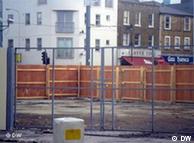 The spot where Reeves furniture store used to stand is now barrenThe British economy, which throughout the last 10 years has been powered by consumer spending, is now struggling.Increased rents, business taxes and red tape have forced some companies to think twice before setting up shop again.
The spot where Reeves furniture store used to stand is now barrenThe British economy, which throughout the last 10 years has been powered by consumer spending, is now struggling.Increased rents, business taxes and red tape have forced some companies to think twice before setting up shop again. I can see this taking three or four months," says Carl Nielson, owner of the Rock Bottom music shop. "It's not an easy thing to do. But we're not ones for giving up." Three weeks after the riots, he was unable to give Deutsche Welle a final figure of the damage they caused.
Officials say they recognize the need to help the smallest retailers the most. In Croydon, that means the independent stores on London Road, away from the main shopping area.
"It was these small shopkeepers, these one-man-bands, who were perhaps not insured because the premiums are so high and the profit margins are low," says Steve O'Connell, local councilor and London Assembly member for Croydon. "They were the hardest hit in terms of looting and smashing of windows."
Financial help
Between the British government, the mayor of London and local councils, businesses can receive more than the equivalent of 75 million euros in help. But critics say they fear it won't go to those retailers who need it most.
O'Connell says the money could help regenerate an already depressed suburb: "If there's any good out of this, it is to shine a light on that area [London Road] and say that this really does need building up and improving."
"Now there's a bit of funding, hopefully this will be to the good of the shopkeepers and residents who have suffered so much," he adds.
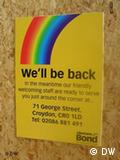 Businesses say they are optimistic about reopeningElsewhere other companies have rallied round the victims. Law firms have offered 'pro-bono' legal advice to small retailers whose stores were damaged.
Businesses say they are optimistic about reopeningElsewhere other companies have rallied round the victims. Law firms have offered 'pro-bono' legal advice to small retailers whose stores were damaged.Following a visit to Croydon and other areas affected by the riots, London Mayor Boris Johnson said he recognized the unique situation many independent shops found themselves in.
"It is clear that there is also room for another fund, particularly to help those small businesses, often with fewer than 10 employees, that have lost custom, lost footfall, lost cash flow and are in need of immediate help," said Johnson.
The mayor should be concerned. With less than a year until the London Olympics open, many commentators say the British capital has a lot of work to do to rebuild its image following the riots. They say the government cash should help ensure the restoration of riot-damaged buildings is completed before next July.
But critics warn that the cash won't go far enough. With the British economy expected to weaken further, the government's opponents say it will take a lot more money to help bring many small retailers back from the brink.
Author: Nik Martin, London
Editor: Nancy Isenson
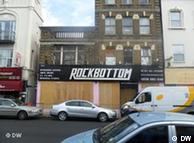
沒有留言:
張貼留言